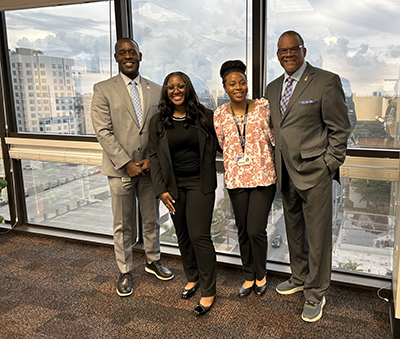By Bobby R. Henry, Sr., Publisher, with Westside Gazette interns Jahziah Defoe and Renada Toyer
In one of the most candid sit-downs with Broward County Public Schools leadership, Superintendent Dr. Howard Hepburn opened his doors to the Westside Gazette for an in-depth interview. Joining me were two of our high school interns, Jahziah Defoe of Fort Lauderdale High School and Renada Toyer of Western High School, representing the student voices at the heart of the county’s challenges.
The conversation covered some of the most pressing issues facing Broward County: widening achievement gaps, school closures in Black and Brown neighborhoods, teacher retention, technology failures, and the role of students in shaping their own education.
Closing the Achievement Gap: “Not Just About Learning, But Opportunity”
Dr. Hepburn, a Belle Glade native whose parents migrated from Jamaica, acknowledged the stark gaps in achievement between Black, Latino, and white students. He stressed that inequities are not only academic but also structural.
“Sometimes it’s not just about a learning or achievement gap—it’s about an opportunity gap,” Hepburn said. “If a child should be in Algebra but is instead stuck in Pre-Algebra, that’s not just lost time; it’s lost opportunity. We have to hold ourselves accountable for putting kids in the courses they deserve.”
One controversial step he defended was the closure of Broward Estates Elementary as a traditional school, which was repurposed into an early learning center. “We found that many children in the area were not kindergarten ready. If you start the race behind, you’re playing catch-up all the way through high school,” he explained.
Parents Left in the Dark
Intern Jahziah Defoe pressed the superintendent on parent involvement, asking how families can better support students outside the classroom. Hepburn admitted a glaring gap:
“There’s an educator-to-parent gap. Too often, parents simply don’t know the opportunities available for their children. That’s why we’re launching a ‘Did You Know?’ campaign—bite-sized facts to empower families with the right questions and expectations.”
Equity in AP and Magnet Programs
When asked why schools in predominantly Black neighborhoods often offer fewer Advanced Placement, STEM, or gifted programs than wealthier schools, Hepburn called it a leadership issue.
“We review master schedules to ensure offerings match the student body. If a principal isn’t using objective data to build opportunities, that’s a problem,” he said.
He noted that while AP courses require strict criteria, alternative paths like ACE and dual enrollment can ensure students still access college-level coursework.
Intern Defoe raised concerns about under-resourced magnet programs, including Dillard High’s performing arts program. Hepburn admitted the shortage of qualified teachers remains a challenge, noting that many teacher education colleges have closed due to declining enrollment. He proposed partnerships with businesses to provide “adjunct-style” instructors in high-demand areas like engineering and the arts.
Technology Failures and New Investments
Intern Renada Toyer voiced frustrations with outdated technology, recalling delays during AP testing. Hepburn acknowledged the issue:
“You’re absolutely right. Much of our equipment is outdated and beyond warranty. Thanks to the board’s decision last week, students and teachers will receive state-of-the-art laptops and upgraded systems. You’ll see a turnaround in the next few months.”
He also highlighted Broward’s role as the world’s largest adopter of Microsoft 365 Copilot, aiming to use AI tools to reduce teacher workload.
Teacher Retention and Black Leadership
I pressed Hepburn on teacher attrition and the shortage of Black educators in leadership roles. He pointed to affordability as a critical barrier.
“We can recruit teachers with palm trees and beaches, but many leave within months because they can’t afford to live here. That’s a Broward and Miami-Dade problem,” Hepburn said.
He outlined ongoing efforts to partner with historically Black colleges, while also bringing in career-changers and building their pedagogical skills. “Retention will depend on pay, but also on building professional support for second-career educators,” he added.
School Closures in Black and Brown Communities
Perhaps the toughest questions came at the end: Why are schools in Black neighborhoods the first to close, underfunded, and the last to be rebuilt?
Hepburn did not shy away:
“I can’t change the past. But what I can commit to is using objective data. If enrollment is down, if birth rates are low, we have to make hard decisions. But when we close a school, we must repurpose the building for the community—whether that’s an early learning center, a senior center, or another service hub. Empty schools are not an option.”
He also pointed to rising performance in historically underperforming schools like Dillard, where grades and graduation rates have climbed under new interventions.
Students Demand a Voice
The interns raised one final concern: students feel unheard. Toyer asked how students can play a greater role in shaping district policy. Hepburn urged student advocacy:
“Find your voice. Demand a seat at the table. I’ve put pressure on principals to create strategies for student engagement, but it has to come from you too. Advocate, organize, and hold us accountable.”
Looking Forward
From outdated technology to systemic inequities, Dr. Hepburn acknowledged that the challenges are steep. But he expressed optimism that collaboration between district leaders, parents, and students can redefine Broward’s future.
“It’s not about where you’re from—it’s about how you take advantage of the opportunities in front of you,” he said, reflecting on his own journey from Belle Glade to superintendent of the nation’s sixth-largest district.
As we closed, I reminded him—and our readers—that the families of Broward County would be holding him to his promises. The future of our children, and the integrity of this school system, cannot be left to chance.

